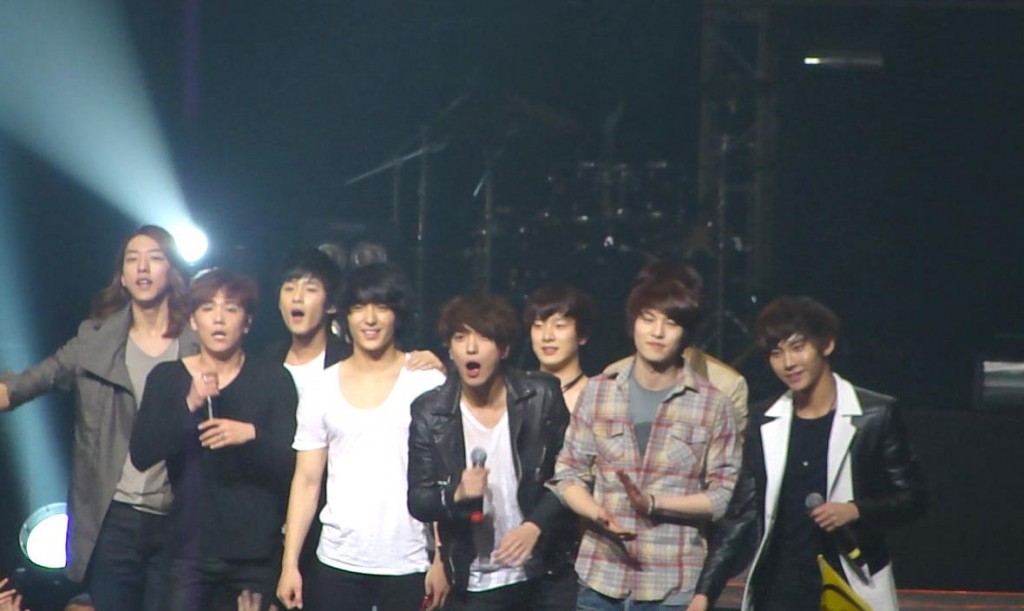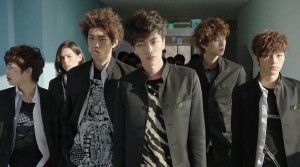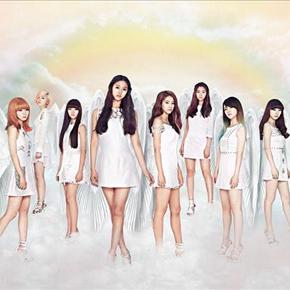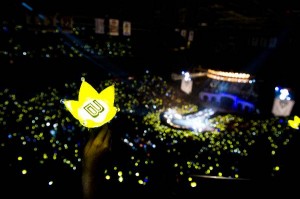 With news of CNBLUE‘s upcoming world tour as well as the debut and future debut of Never Mind and Iconize respectively, there’s a clear upswing in the prospects for idol bands. The previous year saw the debut of Lunafly’s soothing melodies, and LED Apple has been receiving praise for their rock spin on popular idol songs, including Big Bang‘s “Love Song” and Girls’ Generation‘s “Mr. Taxi.” We’ve covered the idol-artist before as well as well as mixed reviews for idol contributions to their music; but specifically, the idol band has the potential to generate greater following and admiration based on basic structural differences that set them apart from dance idols, as well as their perceived image and attitudes towards music.
With news of CNBLUE‘s upcoming world tour as well as the debut and future debut of Never Mind and Iconize respectively, there’s a clear upswing in the prospects for idol bands. The previous year saw the debut of Lunafly’s soothing melodies, and LED Apple has been receiving praise for their rock spin on popular idol songs, including Big Bang‘s “Love Song” and Girls’ Generation‘s “Mr. Taxi.” We’ve covered the idol-artist before as well as well as mixed reviews for idol contributions to their music; but specifically, the idol band has the potential to generate greater following and admiration based on basic structural differences that set them apart from dance idols, as well as their perceived image and attitudes towards music.
Idol bands as a whole present a more inherently familiar image with respect to music than any boy or girl group, primarily because a band tends to be responsible for all sounds in their song, whether they were involved in its composition or not. The deeper connection to the music makes it mandatory that the members at least like what they’re playing: this is probably why the images of the few idol bands around haven’t changed nearly as drastically as those of the more dance-oriented groups. These characteristics of a band draw more from the music aspect of idoldom rather than the performance aspect that is concerned with dance and choreography.
That’s not to say that bands don’t perform well or that traditional dance idol groups are in any way musically inferior to bands: they are just two different types of group that each have the capacity to attract a different crowd. Bands don’t have choreography that can entertain like a dance group or a multitude of vocals to utilize while the dance groups lack as much freedom with respect to music involvement; their weaknesses are the other’s strengths. However, the idol band holds the upper hand in terms of structural familiarity to a global audience as a contributor to all parts of music, not just performances. And for the time-being, they also benefit from the low number of idol bands around: so far, each group has managed to separate themselves from one another, but with too many, it’s possible for too much overlap to occur.
 From what Johnelle and Jessie had to say about FT Island and CNBLUE’s joint concert, Stand Up, in the US last March, idols that do it, all of it, live can bring a new experience to concert, much different from seeing the typical singing and dance performance, with perhaps a remix here and there. And perhaps that is another tool in the idol band’s belt for expanding overseas. A genuinely incredible performance produced from top to bottom in front of your eyes combined with fan interactions and explosions of inhumane energy from the performers is an experience that is most likely unforgettable, akin to those dance idols that wow every time with stable vocals and difficult choreography on those weekly music shows.
From what Johnelle and Jessie had to say about FT Island and CNBLUE’s joint concert, Stand Up, in the US last March, idols that do it, all of it, live can bring a new experience to concert, much different from seeing the typical singing and dance performance, with perhaps a remix here and there. And perhaps that is another tool in the idol band’s belt for expanding overseas. A genuinely incredible performance produced from top to bottom in front of your eyes combined with fan interactions and explosions of inhumane energy from the performers is an experience that is most likely unforgettable, akin to those dance idols that wow every time with stable vocals and difficult choreography on those weekly music shows.
Examples of the appeal of a band are shown by tvN‘s second installment in their ‘Flower Boys’ series, Shut Up! Flower Boy Band, as well as the incorporation of the ‘Idol Super Band’ at the KBS Gayo Daechukje. The television series consistently brought in ratings over 1%, averaging as high as 2.70% for an episode, indicating the success of the cable series. Though, of course, the plot had to do with more than just the band, some undeniable highlights of the series were the times they got to perform their music.  The ‘Idol Super Band,’ made up of idols from different groups that came together to play instruments and sing, was responsible for grabbing the highest ratings throughout the otherwise lackluster music festival, adding a well-received spin to the evening’s festivities. The integration of such a segment as opposed to the normal, awkward joint stages perhaps has to do with the understanding that fans appreciate attempts at greater involvement in music.
The ‘Idol Super Band,’ made up of idols from different groups that came together to play instruments and sing, was responsible for grabbing the highest ratings throughout the otherwise lackluster music festival, adding a well-received spin to the evening’s festivities. The integration of such a segment as opposed to the normal, awkward joint stages perhaps has to do with the understanding that fans appreciate attempts at greater involvement in music.
Of the various entertainment companies around, FNC Entertainment seems to be the label that has best utilized the idol band for revenue. Housing three of the very few idol bands, they’ve successfully merged the idol image with that of a legitimate band by effectively using the common trainee system to form a band as opposed to the normal, natural formation. But the result is a group capable of more than hand-syncing though there’s unfortunately few opportunities to show it. Starting with FT Island in 2007, the company has been consistently moving forward, debuting CNBLUE in Korea in 2010, and lastly AOA in 2012. In addition to their populating the idol scene with bands, they’ve moved forward the idea of composition among their bands, with the whole of FT Island and CNBLUE’s Yonghwa and Jonghyun regularly writing songs that are included in their albums, but hidden from most eyes due to their more typical title songs. Most recently, with CNBLUE’s comeback, they were able to have fully live stages their comeback week as well as a couple more in the weeks after. These clearly showed the difference that playing live made as both sound and performance quality were increased by miles, clearly producing the proper environment for a band, not one that’s Yonghwa’s performance featuring Jonghyun and those guys holding the instruments.
 AOA, on the other hand, at first glance seems a nifty way to combine the idol band with the typical dance group, especially since they fill in the niche of a female idol band in the industry. But instead of fully embracing the idea of the band, AOA has relegated it as a side addition, a group that sometimes can take out instruments and play–a concept that is neither here nor there, especially when the music gifted to the group tends to be better performed as a dance group. However, the group is still young and has time to get their act together, though I can’t think of a solution that includes all members other than for a major transition into a band group with the remaining members perhaps dancing at the same time or picking up smaller instruments.
AOA, on the other hand, at first glance seems a nifty way to combine the idol band with the typical dance group, especially since they fill in the niche of a female idol band in the industry. But instead of fully embracing the idea of the band, AOA has relegated it as a side addition, a group that sometimes can take out instruments and play–a concept that is neither here nor there, especially when the music gifted to the group tends to be better performed as a dance group. However, the group is still young and has time to get their act together, though I can’t think of a solution that includes all members other than for a major transition into a band group with the remaining members perhaps dancing at the same time or picking up smaller instruments.
Recently arrived and coming soon are punk rock group Never Mind and rock band Iconize. The former had three of four members previously involved in band Urban Daisy prior to their debut as Never Mind, putting a bit of a twist on the normal trainee system. The group also writes their own songs. Officially, they’ve released “Shooting Star” and “Hoi Hoi” and plan to promote in Korea and Thailand simultaneously. Through their released music, they’ve has already shown a capacity for making music that will hopefully only grow. Their punk rock image differs from already established bands, which is good for developing their niche. Iconize similarly was discovered as a whole rather than as individuals put together via the system by none other than the producer of Buzz. They’ve even solidified an endorsement deal before debuting. Seeing as debuts of lasting and popular bands tend to be spread out more, two in the last year and two planned for this year already seems to be much faster than before, albeit in part due to the low numbers.
Concerning Hallyu, specifically with the United States as a reference point, it isn’t surprising that K-pop hasn’t hit the mainstream. Very few groups, if any, have more than five members if they aren’t a band. The intense focus on appearance in K-pop that spurs make-up for men and more delicate concepts for women isn’t exactly the accepted norm in a country that for all the freedoms it boasts still has trouble accepting effeminate men and paying both sexes equally for the same work. Once indoctrinated into the ways of K-pop, it’s easy to see how each member has their own appeal and purpose within a group–the dancer, the main vocalist, the one with variety appeal, etc– and arguably, an idol group needs those members whose specialties are outside of  music in order to gain their group sufficient recognition.
music in order to gain their group sufficient recognition.
But outside of K-pop, the many members seem to do the same thing, all meshing into one, making some wonder why there are so many. With a band, the positions seem more integral to a group, providing a familiar concept to get behind. In addition, the repertoire of bands tends to fall along a consistent style, which outside of K-pop is more of the norm. The chance of a person taking on the role of a casual fan becomes greater, in part because of that recognizable image. And to appeal to a wider audience, grabbing onto those casual fans that like the music and are willing to give songs more than just a couple of listens is integral.
It’s for this more palatable image and recognition of ability that perhaps these bands have a greater chance at attracting audiences than a dance idol group. Who knows, perhaps 2013 is the year for idol bands? What do you think, Seoulmates?
(AGB Nielsen Media Research, eNewsWorld, MyDaily, Sports World, CNBLUESTORM, toeastmusic, FNC Entertainment, Nekki Entertainment, KBS)


